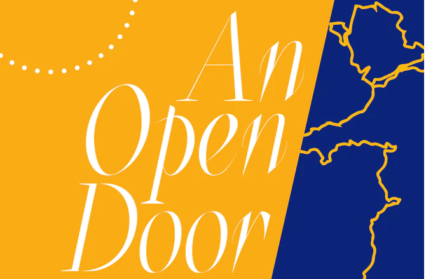Josh Weeks reviews An Open Door: New Travel Writing for a Precarious Century, a collection of essays which put a ‘Welsh gaze on the rest of the world’.
Is there room for Wales in travel writing? As editor Steven Lovatt writes in his introduction to An Open Door: New Travel Writing for a Precarious Century, ‘despite Wales having for centuries been written about […] never before have Welsh and Wales-based authors been invited to ‘write back’ about their experiences as travellers within and beyond the country.’ In bringing together a talented group of writers, An Open Door marks a welcome challenge to this oversight.
The modes of writing back contained in the collection are as diverse as they are powerful. The opening essay, ‘Carioca Cymreig’ by Eluned Gramich, charts the author’s trip to visit her husband’s family for the first time in Brazil. Gramich’s description of a New Year’s Eve celebration in Rio de Janeiro is beautifully done, and her insights into the difficulties of negotiating a new language show how openness and commitment are as important as grammar. Wales becomes a place of arrival in Giancarlo Gemin’s ‘The Valleys of Venice: Memories of an Italian Immigrant in Wales’, the protagonist of which is the author’s late mother, Elena. ‘Her story is about the physical and emotional bond made with the country in which you take root,’ Gemin informs us, ‘a country whose very recollection could make her misty-eyed after her return to Italy.’
Perhaps unsurprisingly, the experience of immersion in an initially unfamiliar culture is a dominant theme throughout the collection. Faisal Ali’s ‘From the Desert to the Docks and Back’ is a terrific piece on the author’s first trip to Somalia: the country from which his great-grandfather emigrated in the early twentieth century. ‘The Murmuration’ by Julie Brominicks, on the other hand, is an episodic account of a ‘Brit on a scholarship’ to Japan that deals expertly with questions of identity and belonging.
Another notable feature of An Open Door is the balance it strikes between beauty and incisiveness. Grace Quantock’s ‘Gone to Abergavenny’ is part reflection on the material and affective afterlife of an old asylum where the author finds refuge, part defiant call for accessibility and respect for marginalised communities: ‘I won’t be locked up – not in my home, not in an institution, not in other people’s limiting judges.’ Meanwhile, in ‘Clearances’, Kandace Siobhan Walker draws from her memories of visiting her grandmother and cousins on the island of Sapelo to lay bare the legacies of colonial dispossession that underwrite late-capitalism.
Some of the essays effectively blur the boundary between interior and exterior landscapes. Siân Melangell Dafydd’s ‘Son of a Yew Tree’ offers a dream-like excursion through the history of the churchyard that inspired the name of the author’s son. Mary-Ann Constantine’s ‘King Stevan’s Road’ and Neil Gower’s ‘From Light and Language and Tides’ are more cartographic in their splendour. While the former takes shape around the labyrinth of roads that structure the author’s research in Brittany, the latter is framed by a poetic account of creating an ‘index to a life’ for the ex-poet laureate Simon Armitage.
Final essay ‘All Among the Saints’ by E. E. Rhodes recounts a long-awaited pilgrimage to Bardsey Island that proved impossible for the author and her friends twenty-five years earlier (the childhood question of whether ‘one trip to Rome counts as three to Bardsey’ hovers spectrally throughout). Sophie Buchaillard’s ‘Revolving Doors’ recounts a different kind of pilgrimage: ‘to show my son his French roots, a trip delayed by the passing of his father and the many questions that came after about where we belong, now that he is no longer with us.’ Like many of the essays on display here, Buchaillard prises open the space between the familiar and the unknown, showing us how departure and return, loss and discovery, are not always easy to distinguish.
So, back to the opening question: is there room for Wales in travel writing? The short answer is absolutely. The long answer — or at least the beginning of its articulation — is to be found among the pages of this brilliant, essential collection.
An Open Door: New Travel Writing for a Precarious Century is available now from Parthian.











